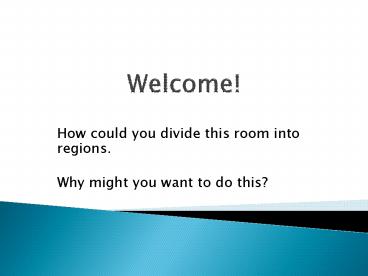How could you divide this room into regions' - PowerPoint PPT Presentation
1 / 15
Title:
How could you divide this room into regions'
Description:
What Causes Regionalism to develop? Geographic/physiographic ... The revenge of the centre Ontario regionalism, 1990 onwards ... – PowerPoint PPT presentation
Number of Views:29
Avg rating:3.0/5.0
Title: How could you divide this room into regions'
1
Welcome!
- How could you divide this room into regions.
- Why might you want to do this?
2
Because were talking about REGIONALISM!
3
- Take a look in the section you are sitting in.
- Think about what resources you have, and which
ones you lack. - Is there a section that has an advantage? Which
section is the most disadvantaged?
4
Regionalism
- A social and psychological attachment to a
particular place - 3 Components
- Importance of region in an individual's sense of
identity - The degree to which individual identifies with
his/her region - Strength of commitment to region
- Region is a way of defining identity, values and
interests. - Strong sense of regional attachment vote on
basis of regional interests
5
Regionalism
- What Causes Regionalism to develop?
- Geographic/physiographic
- Rockies, Prairies, Mississippi River
- Urban vs. rural
- GTA, Chicago-New York-Washington Triangle
- Cultural/linguistic
- French/English, Aboriginals, Visible Minorities
- Historical
- US (North/South, Red/Blue)
- Canadian settlement
6
Regionalism in CanadaHistorical Development
- Pre-Confederation
- Great Lakes/St. Lawrence
- Upper vs. Lower Canada
- Post Confederation
- National Policy
- Manitoba and British Columbia (CPR)
- Western Settlement
- The Last 30 Years
- Quebec
- Western Alienation
- Atlantic Canada
Note Unlike the United States gradual Westward
expansion, Canadas proceeded in patches.
Different areas were settled at different times
by different groups using different technologies
and creating differing economies.
7
Regionalism in CanadaCurrent Trends
- Newfoundland 1975 onwards
- Western alienation II, 1970s onwards
- http//archives.cbc.ca/politics/parties_leaders/cl
ips/15455/ - The revenge of the centre Ontario regionalism,
1990 onwards - Big city governments and First Nations
governments new regional players?
8
Dealing with Regional Alienation
- From the centre (federal government)
- Better representation
- Better intergovernmental relations
- Better federal administration
- From the region
- Building up provincial power
- Economic development self-reliance
9
Specific Tools for Addressing Regional Issues
- First Ministers Meetings
- Provincial leaders meet with PM
- Mayors Meeting
- 2004 Mayors from Canadas 10 largest CMAs
gathered to discuss economic and social issues - Equalization Payments
- Funding is given to have-not provinces so that
they can provide services on par with others
across Canada (think health care ideals) - Caucus Meetings
10
Final Thought
- Over the course of its history, the powers of the
provinces have grown. Whereas traditional
regional divides have been overcome due to
advances in transport and communication
technologies, the new regionalism is now defined
by provincial ties. Is the solution to overcoming
regionalism greater decentralization, or greater
centralization?
11
What is a Caucus Meeting?
- All the elected members of a party meet to
formulate policy, which will in turn become the
platform they bring back to their particular
legislature. - If party has a majority, this policy agenda can
easily become legislation. If party has a
minority, or is the opposition, then they have to
work to get their policy ideas heard/enacted. - While all who attend a caucus meeting are from
the same party, each has their own agenda, based
on their region and their constituents.
12
Who Wants to be a Canadian Politician?
- This simulation places each of you as an MP of
the ruling Federal Party. - Each MP comes from a specific region, and
therefore has certain policy goals which may
differ from other regions. - The Prime Minister, though coming from his/her
own region, must also think of the party and the
good of the nation. - Note Just like in real liFe, there are
consequences to choosing (or not choosing) a
particular pathso be prepared for a scandal or
two! - The goal of the simulation is to formulate a
policy agenda - The goal of each MP is to represent his/her region
Canadian Politician?
13
Time Line
TODAY
- Receive assignments
- Receive/study policy cards
- Library Research your policies
- Engage your peers broker some deals, stab some
backs - PM CHAIRS CAUCUS MEETING, VOTE ON POLICIES
- Debrief
TOMORROW
FRIDAY
14
Your Government
- North MP (2)
- Ontario MPs (9)
- Quebec MPs (7)
- Atlantic MP (3)
- Prairie MP (4)
- Pacific MP (6)
- PRIME MINISTER (1)
15
Debrief
- What challenges did you face in getting your
policies agreed upon? - Where there any regional patterns/alliances at
work? Why? - What aspects of this game compare to real life?
What aspects differ? - Does the policy agenda created today reflect the
values of Canada? Why/why not? - If there was one change you would make to the
simulation, it would be

